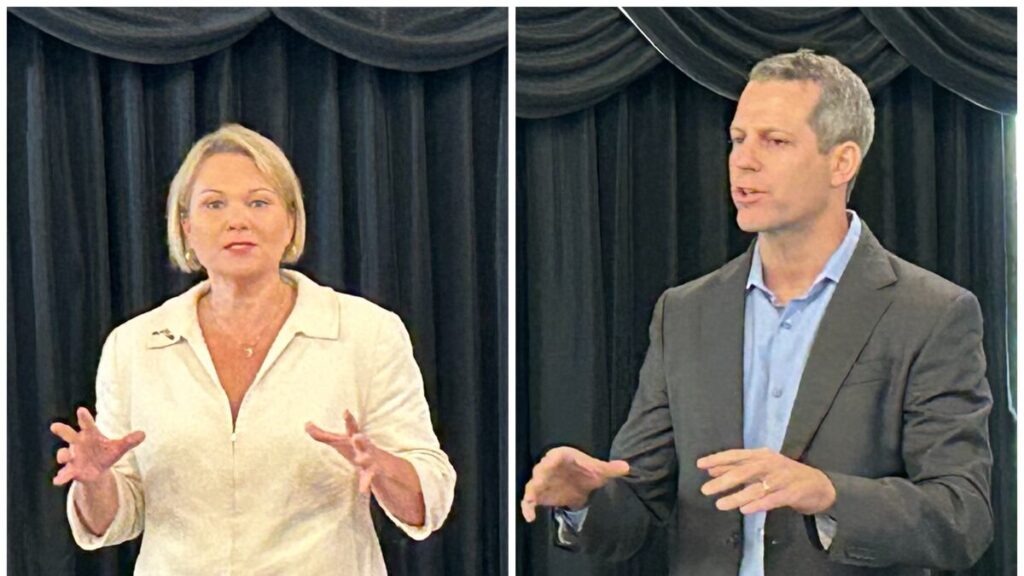Andrew Warren Accuses Opponent of Antisemitism in Tampa Political Race
Background on the Controversy
In the competitive landscape of local Tampa politics, Andrew Warren, the current state attorney, has faced persistent criticisms regarding his financial support from billionaire philanthropist George Soros. These attacks, frequently employed by opponents, have taken on a new dimension as Warren confronts his challenger, Suzy Lopez, in the upcoming November election.
Accusations of Antisemitism
Recently, Warren made headlines by condemning Lopez for "false, antisemitic attacks" after she insinuated that he is a "Soros-funded outsider." In her statements during a campaign forum organized by the Greater Brandon Chamber of Commerce, Lopez remarked that she does not require guidance from outsiders like Soros regarding the needs of her community.
- Key Quote from Suzy Lopez:
- "I don’t need somebody like George Soros… telling me the needs of my hometown."
Warren, who identifies as Jewish, firmly responded to Lopez’s claims, elaborating that such accusations perpetuate harmful stereotypes and conspiracies about influential Jewish figures.
Significance of Soros in Politics
George Soros, a prominent Jewish philanthropist, has become emblematic of both political discourse and conspiracy theories. Many experts on antisemitism note that using his name in a derogatory context promotes harmful stereotypes and feeds into narratives used by hate groups.
- Expert Insight:
- According to the Anti-Defamation League, commentary surrounding Soros often treads into antisemitic territory, as it plays into age-old prejudices about Jewish power and control.
The Role of Campaign Statements
During the political discourse, Sheriff Chad Chronister, a supporter of Lopez, claimed that Soros contributed to Warren’s 2016 campaign with the intention of flipping the prosecutor’s office. He dismissed Warren’s accusations as "absurd" and lacking merit.
Understanding Antisemitism in Political Rhetoric
Warren’s rebuke of Lopez highlights a broader issue within political campaigns, where invoking Soros’s name may have unintended antisemitic implications.
- Points to Consider:
- The term "Soros-funded" is often used interchangeably with accusations of external manipulation in politics.
- This language can evoke dangerous stereotypes historically associated with Jewish people.
Soros’s Background and Philanthropy
A Hungarian-born Jew who survived the Nazi occupation, Soros has become a renowned figure in global philanthropy with his Open Society Foundations. His organizations support causes aimed at enhancing democracy, justice, and human rights.
Contributions and Critiques
Critics often argue that wealthy individuals, including Soros, wield excessive influence over political landscapes through their financial contributions. However, the criticism becomes contentious when it intersects with ideas about race and ethnicity, particularly concerning Soros.
- Expert Commentary:
- As Alon Milwicki, a research analyst at the Southern Poverty Law Center, noted, criticism of Soros should be seen in light of the disproportionate negative attention he receives compared to other wealthy figures in politics.
The Broader Political Landscape
Warren’s previous campaigns have also drawn Soros-themed criticisms, echoing similar sentiments that are now resurfacing during the current election cycle.
- Financial Support Context:
- In the 2016 election, Soros donated significantly to the Florida Democratic Party but the extent of his support for Warren remains unclear.
Many local and national political commentators have weighed in on the appropriateness of utilizing Soros’s name as a political tool during the election cycle.
Conclusion: The Ongoing Debate
The clash between Andrew Warren and Suzy Lopez raises important questions about the role of money in politics and the potential for language to slip into dangerous territory. Political discourse surrounding figures like George Soros not only impacts elections but also reveals underlying societal tensions regarding race, wealth, and influence.
- Call to Action:
- Understanding these dynamics is crucial for voters as they evaluate candidates’ messages and the implications of their rhetoric in shaping public perception.
For further reading on the implications of money in politics, visit Open Secrets to explore detailed campaign finance information.
Engage with the ongoing discussions around antisemitism and political rhetoric by visiting organizations like the Anti-Defamation League for more insights on hate and extremism in political discourse.


